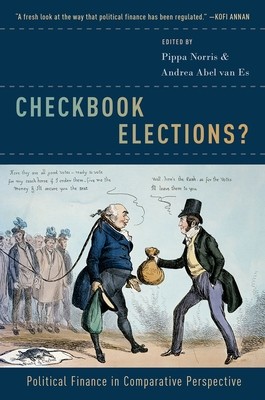
- We will send in 10–14 business days.
- Publisher: Oxford University Press, USA
- ISBN-10: 0190603615
- ISBN-13: 9780190603618
- Format: 15.5 x 23.1 x 2.3 cm, minkšti viršeliai
- Language: English
- SAVE -10% with code: EXTRA
Checkbook Elections? (e-book) (used book) | bookbook.eu
Reviews
Description
Money is essential to the functioning of electoral politics, yet regulating its appropriate use raises complex and controversial challenges in countries around the world. Both long-established democracies and emerging economies have been continually plagued by problems of financial malfeasance, graft, corruption, and cronyism. To throw new light on these important challenges, this book addresses three related questions: (1) what types of public policies are commonly used in attempts to regulate the role of money in politics?, (2) what triggers landmark finance reforms? and, (3) above all, what works, what fails, and why - when countries implement reforms? Checkbook Elections? presents an original theory for understanding policies regulating political finance, reflecting the degree to which laws are laissez-faire or guided by state intervention. Each chapter is written by an area specialist and collectively cover long-established democracies as well as hybrid regimes, affluent
post-industrial societies (Sweden, the United States, Britain, and Japan), major emerging economies (Russia, Brazil, and South Africa) and developing societies (India and Indonesia).
EXTRA 10 % discount with code: EXTRA
The promotion ends in 24d.01:07:38
The discount code is valid when purchasing from 10 €. Discounts do not stack.
- Publisher: Oxford University Press, USA
- ISBN-10: 0190603615
- ISBN-13: 9780190603618
- Format: 15.5 x 23.1 x 2.3 cm, minkšti viršeliai
- Language: English English
Money is essential to the functioning of electoral politics, yet regulating its appropriate use raises complex and controversial challenges in countries around the world. Both long-established democracies and emerging economies have been continually plagued by problems of financial malfeasance, graft, corruption, and cronyism. To throw new light on these important challenges, this book addresses three related questions: (1) what types of public policies are commonly used in attempts to regulate the role of money in politics?, (2) what triggers landmark finance reforms? and, (3) above all, what works, what fails, and why - when countries implement reforms? Checkbook Elections? presents an original theory for understanding policies regulating political finance, reflecting the degree to which laws are laissez-faire or guided by state intervention. Each chapter is written by an area specialist and collectively cover long-established democracies as well as hybrid regimes, affluent
post-industrial societies (Sweden, the United States, Britain, and Japan), major emerging economies (Russia, Brazil, and South Africa) and developing societies (India and Indonesia).


Reviews